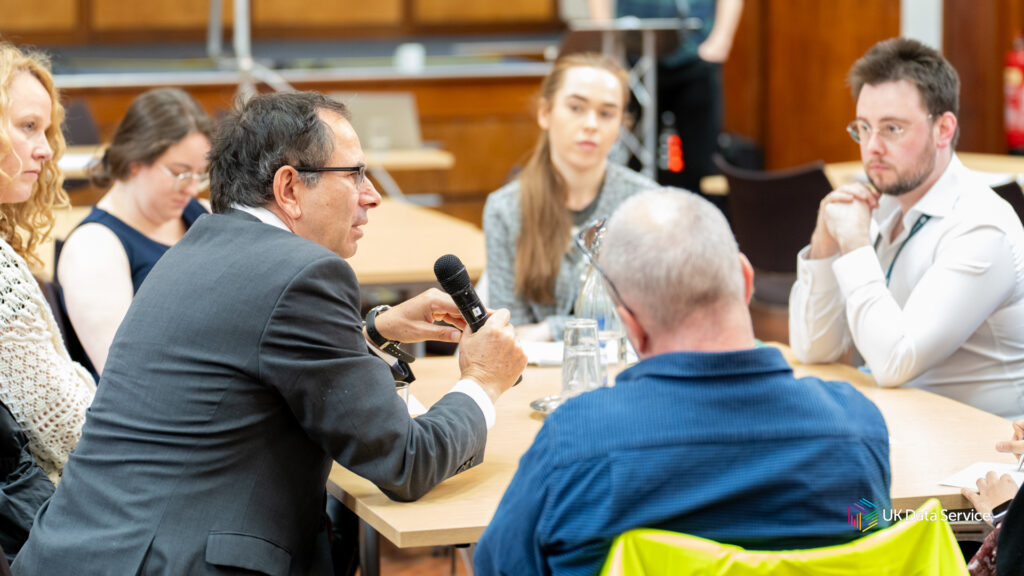 Neil Grindley, based at Jisc, reflects on his first year as co-investigator and deputy director for the UK Data Service.
Neil Grindley, based at Jisc, reflects on his first year as co-investigator and deputy director for the UK Data Service.
Towards the end of 2023, a colleague asked me if I might consider taking over as the senior manager of the Jisc UK Data Service (UKDS) team.
“Does it matter that I have no social science research experience?” I asked her.
The answer – it turns out – is both no and yes.
After a year or so of working with the team at Jisc, and with colleagues from the other partner organisations that make up the UKDS consortium, it is clear to me that the service is in very safe hands.
Not only is it run by people with wide and deep expertise, but they are also absolutely committed to making data as open and accessible as possible, and for that data to have a significant and lasting impact on research, on policy-making, and on society.
One of the highlights of last year was attending the Poverty in Data Early Careers Workshop, a face to face gathering in Manchester that brought together seasoned experts with colleagues nearer the start of their careers.

As the title suggests, the focus was on how data can be used to illuminate and explore societal issues that are relevant to low incomes, inequality, families in need, and a plethora of other political questions.
I have a background of working in the digital humanities, and have worked at Jisc running a digital preservation programme; and then been responsible for two national library and archival discovery services for more than a decade.
Whilst that has given me insights into how to collaborate, and what it takes to run national-scale services, it didn’t quite prepare me for the realisation of how much data really matters. And by that I mean, how data can (and must) be used to influence the quality of people’s lives.

This is where it turns out that having no social science research experience is an issue. Not a problem as such; more like a frustration.
It was so enlightening listening to Professor Donald Hirsch giving the keynote at the event. I have done some reading in my own time about the reasons for, and the aftermath of, the 2008 economic disaster, including the excellent book by Adam Tooze, Crashed: how a Decade of Financial Crises Changed the World.
But the graphs that Hirsch showed, based on the type of data held by the UKDS, sketched out a broader perspective on poverty and inequality going back to the late 1970’s. Whilst the financial policies of the 1980’s were predicated on the idea that “growth will raise all ships”, subsequent studies and close analysis of the data demonstrate that a rising tide does not lift the poor. It leaves them beached.
Hirsch then went on to share a decade by decade account of the decline in growth of UK household incomes.
1980’s – 2.5%
1990’s – 2.3%
2000’s – 1.4%
2010’s – 0.8%
2020’s – 0.04%
I find this analysis deeply interesting, and (by way of full disclosure) the conclusions align with my political worldview that some deeply unhelpful ideologies that were given free rein in the 1980’s continue to cause societal problems today.
The frustration I referred to earlier is that I personally don’t have the expertise to find and analyse the data in the brilliant and insightful ways that were on display at the event.
There are always those that claim (when confronted with data that supports conclusions they disagree with) that statistics can be manipulated to fit any argument. But the more it can be demonstrated that data has been carefully collected, well-curated, professionally managed, and expertly analysed, mistrust in the conclusions must increasingly feel disingenuous.
When I look across the UKDS, and I see the care and attention paid, the substantial long-term investment made by the ESRC feels like a societal win.
By way of a quick addendum to that, any time I start to dig down into the literature, blog posts or reports that my UKDS colleagues create, I almost always catch fascinating glimpses into areas and themes within social-science research that feel like they connect with my arts and humanities interests.
Seeking an explanation of the ‘Hawthorne effect’ that I came across in one report, reveals that it is just one of a number of a phenomena, including the Barnum effect, the Pygmalion effect, and the John Henry effect. So, it’s probably also worth reminding ourselves that it’s not always just about accurate numbers and forensic analysis!
One of the responsibilities within the UK Data Service that rests particularly with the Jisc team is to identify, analyse and communicate the value and impact of the use of the data.
The Data impact blog where these stories, case studies and evidence is gathered has now been going for ten years.
It is great credit to the team that look after it, and everyone who has contributed to it over the years, that we have such a treasure trove of impact materials to accompany the extraordinarily valuable data held by the UKDS. Here’s to the next ten years!
About the author
Neil Grindley is Jisc’s director of content and discovery services.
He is responsible for areas of work that address how to effectively find resources that are relevant to learning, teaching and research. The resources in question may be analogue or digital and the challenge is not only to effectively provide ways of discovering those resources through the use of online services, but also to ensure that they remain discoverable and sustainable over time.
Follow Neil on BlueSky and LinkedIn.
Comment or question about this blog post?
Please email us!
